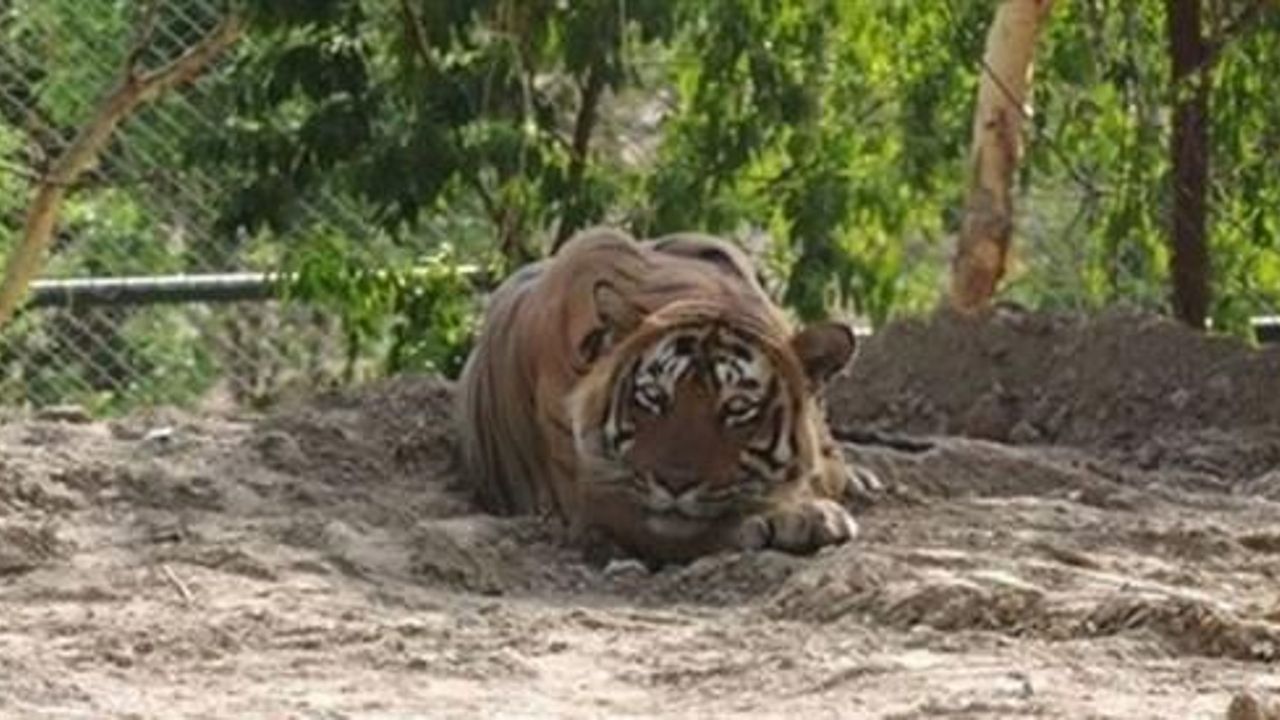India's 'man-eating' tiger to stay in Rajasthan zoo
World |
A court in India's Rajasthan state has rejected a plea to release a tiger who has been branded a killer and caged.

Font Size:
Nine-year-old Ustad was tranquilised and shifted from a national park to a zoo earlier this month after he killed three men, including a forest guard.
A tiger lover had petitioned the court, saying caging the tiger was against India's wildlife laws.
India's tiger population stood at 2,226 in 2014. The country is home to 70% of the world's tigers.
Ustad, who lived in the 400 sq km (99,000-acre) Ranthambore National Park, popular for its tiger safaris, was shot with a tranquilising dart and driven to a zoo 400km (250 miles) away earlier this month.
He had been declared the prime suspect in the killing of a 53-year-old forest guard on 8 May. He was also accused of killing a 23-year-old local man in 2010 and a 19-year-old boy in March 2012.
The tiger is now is caged in an enclosure smaller than a football field in a zoological park in Udaipur district.
- Fears for tourism
Chandramauleshwar Singh, a tiger lover and a regular visitor to Ranthambore, petitioned the high court in Rajasthan against the move.
He said the decision to move Ustad was made without "any scientific probe or investigation into the circumstance of the attack".
Mr Singh said the real reason the park decided to move Ustad was because of pressure from the local tourist industry, which feared visitors would be frightened off by the presence of a man-eater.
The high court in Rajasthan dismissed the plea saying the decision to shift Ustad can "under no stretch of imagination be held to be hasty, arbitrary or unreasonable".
The judges said they did not agree that Ustad's move was prompted by the tourist industry because "tourism thrives on the tigers of Ranthambore and it is not the other way round".
Mr Singh has now appealed to Supreme Court to take a decision on the matter.
Correspondents say the case raises questions for tiger conservation worldwide because India has been very successful in its efforts to increase its tiger population.
As the number of tigers in India have risen, their habitat has shrunk, meaning people and tigers meet more often, occasionally with disastrous results.
More than 60 people are killed by tigers every year in India.
Source: BBC
A tiger lover had petitioned the court, saying caging the tiger was against India's wildlife laws.
India's tiger population stood at 2,226 in 2014. The country is home to 70% of the world's tigers.
Ustad, who lived in the 400 sq km (99,000-acre) Ranthambore National Park, popular for its tiger safaris, was shot with a tranquilising dart and driven to a zoo 400km (250 miles) away earlier this month.
He had been declared the prime suspect in the killing of a 53-year-old forest guard on 8 May. He was also accused of killing a 23-year-old local man in 2010 and a 19-year-old boy in March 2012.
The tiger is now is caged in an enclosure smaller than a football field in a zoological park in Udaipur district.
- Fears for tourism
Chandramauleshwar Singh, a tiger lover and a regular visitor to Ranthambore, petitioned the high court in Rajasthan against the move.
He said the decision to move Ustad was made without "any scientific probe or investigation into the circumstance of the attack".
Mr Singh said the real reason the park decided to move Ustad was because of pressure from the local tourist industry, which feared visitors would be frightened off by the presence of a man-eater.
The high court in Rajasthan dismissed the plea saying the decision to shift Ustad can "under no stretch of imagination be held to be hasty, arbitrary or unreasonable".
The judges said they did not agree that Ustad's move was prompted by the tourist industry because "tourism thrives on the tigers of Ranthambore and it is not the other way round".
Mr Singh has now appealed to Supreme Court to take a decision on the matter.
Correspondents say the case raises questions for tiger conservation worldwide because India has been very successful in its efforts to increase its tiger population.
As the number of tigers in India have risen, their habitat has shrunk, meaning people and tigers meet more often, occasionally with disastrous results.
More than 60 people are killed by tigers every year in India.
Source: BBC
Similar News
Video News

WORLD
26 Mart 2024 - 11:18
Photo News






